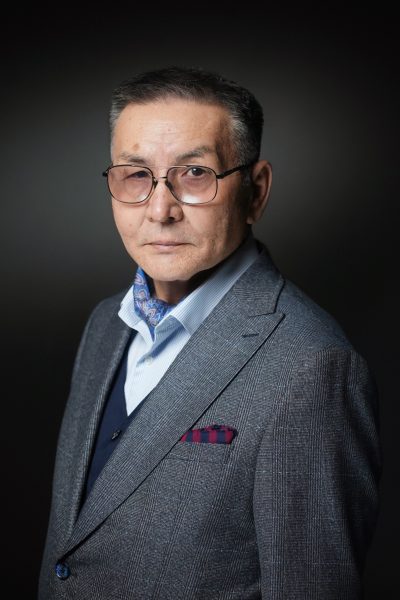
Meyramov Tilektes Uakhituly
Actor, People's Artist of Kazakhstan
Tilyektes Uakhitovich Meyramov was born on May 20, 1948, in the village of Kokpekty, now part of the Bukhar-Jyrau district in the Karaganda region.
In 1971, he graduated from the Kurmangazy Institute of Theatre and Cinematography in Almaty with a degree in “Theatre and Film Acting.”
From 1971 to 1989, he worked as an actor at the M. Auezov Kazakh State Academic Drama Theatre, where he performed over 100 roles. During these years, he also served as chairman of the trade union committee and first secretary of the party committee. From his first steps on stage, his portrayal of Kozы Korpesh attracted the attention of theatre professionals, critics, and audiences.
Possessing a wide acting range and natural talent, Tilektes Meyramov delved deeply into the psychological essence and complex nature of his characters. Early in his career, he masterfully played complex roles such as Kozы Korpesh, Akan Seri, Birsimbay, Zharas, Yerkin, Tokpaev, Walter, Zhantai, and others. He created vivid, emotional, passionate characters with profound inner content, securing a unique place for himself in the theatre repertoire.
The very fact that roles originally played by the great actor Anuar Moldabekov, such as Voynitsky, Zhantyk, and Kerim, were entrusted to him speaks volumes. He did not divide roles into types or characters — his performances were always sincere and truthful, raising his characters to the level of high artistic images. Bright examples of this are his portrayals of Chinggis Khan, Khan Zhangi, Emperor Attila, Bedel, Sorin, Bekter, Antony, and others.
Among his roles, special attention should be given to the characters in A. Suleymenov’s triptych “Situations.” The characters of Jumaat, Malik, and Prosecutor have become symbols of contemporary society, the spiritual height, and the weakness of the nation. His acting mastery, multilayered ideas, and expressive delivery engage the audience in deep reflection and empathy.
Tilektes Meyramov is the first Kazakh actor to master the genre of the monodrama. Over the years, he performed solo performances of: G. Musrepov’s tragedy “Akan Seri – Aktoqty,” R. Seysenbaev’s “Songs of War,” N. V. Gogol’s “Notes of a Madman,” and the plays “Torments of the Mind” based on the works of W. Shakespeare, A. Griboedov, and G. Musrepov.
He trained under such masters as A. Tokpanov, Sh. Zhandarbekova, A. Mambetov, and E. Obaev. Due to his dedication to the arts, talent, and high performance skills, he became a respected figure among colleagues, friends, audiences, and the theatrical community in general. His work can truly be considered the pinnacle of modern national theatre.
From 1989 to 1990, he served as the head of the Theatre Department at the Ministry of Culture of the Republic of Kazakhstan.
From 2001 to 2007, he was the director and artistic director of the G. Musrepov State Academic Theatre for Young Audiences. During his leadership, the theatre won the Grand Prix twice at international festivals and received high praise at the International “Turksoy” Festival in Kazan.
From 2007 to 2011, he was the artistic director of the Youth Theatre of Astana.
In 2011, he graduated from the Kyrgyz State Institute of Arts named after B. Beishenaliev, specializing in “Directing.”
Since 2011, he has been an actor at the Kazakh National Musical Drama Theatre named after Kalibek Kuanyshbayev in Astana.
ROLES IN THE THEATRE:
G. Musrepov “Kozы Korpesh – Bаян Sulu” – Karabay
E. Juasbek “Antivirus” – Asan
T. Dzyudzhenoglu “Avalanche” – Elder
G. Musrepov “Akan Seri – Aktoqty” – Nawan
M. Auezov “Abay” – Senior Abay
R. Otarbaev “A Shadowless Traveller” – Father
D. Ramazan “The Dream of Khan Abulai” – Tole Bi
J. Anui “Joan of Arc, Consumed by Flame” – Cosson
V. Ezhov “The Flying Cranes” – Lukyanov
R. Seysenbaev “Songs of the Front” (monodrama) – Sadyr
W. Shakespeare “Othello” – Brabantio
F. Bordone “The Traces of a Pigeon in the Snow…” – He
A. Vampilov “White Rain” – Saken Tawasary
H. Altai, H. Oralty “The People Who Fled from Altai” – Khalifa Altai
In addition to his work in theatre and cinema, he is also engaged in literary and creative activities. He has translated the plays of A. Gelman “Alone with Everyone,” N. Abdullayev “Two,” I. Vovnyanko “The Death of a Stripper” into Kazakh. He has also adapted for the stage the novels of I. Esenberlin “Lovers,” Ch. Aitmatov “A Day Longer Than a Century,” the novella of R. Otarbaev “The Disrupted World,” and O. Henry’s story “The Chief of the Indians.” He adapted M. Auezov’s novel “The Path of Abai” for a television production.
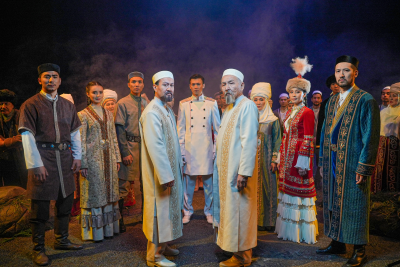 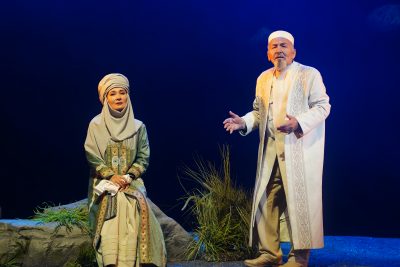 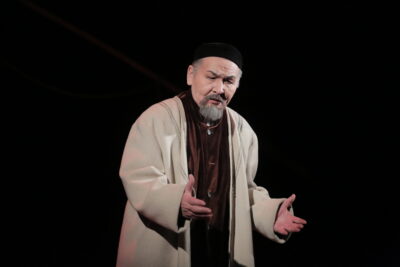
|
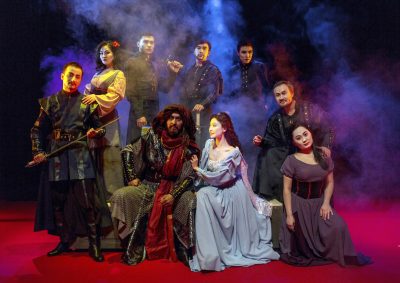 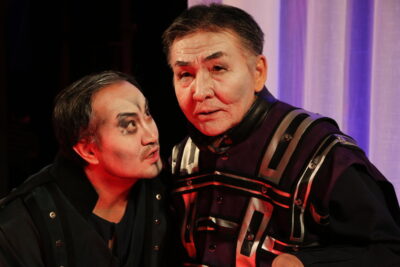 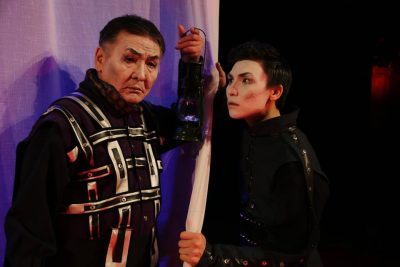
|
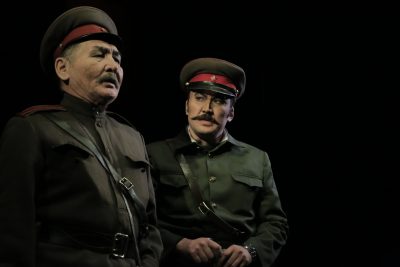 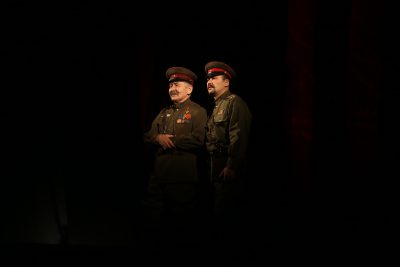 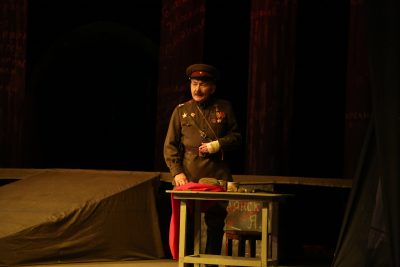
|
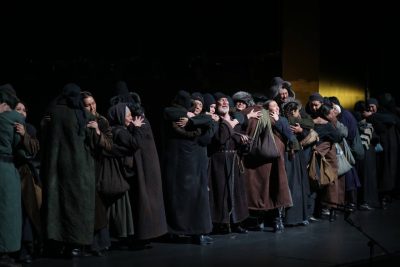 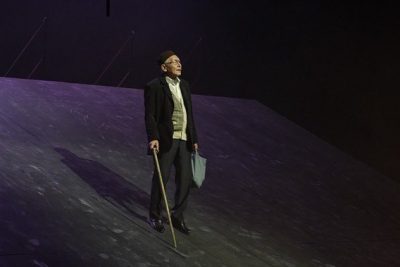 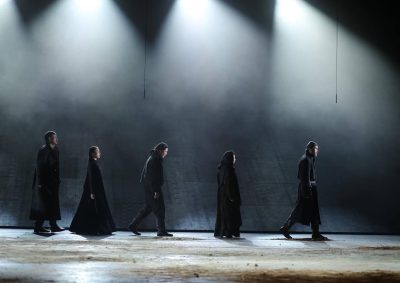
|
Awards:
In 1993, for his portrayal of Genghis Khan in I. Gaipa’s play “Genghis Khan,” he received a nomination for “Best Male Role.”
In 1996, he was awarded the honorary title of “People’s Artist of Kazakhstan.”
In 2004, for his role as Karabay in G. Musrepov’s play “Kozы Korpesh – Bаян Sulu,” he received a nomination for “Best Male Image.”
In 2012, at the XX Republican Festival of Kazakh Drama Theatres, dedicated to the 80th anniversary of A. Mambetov, held in the city of Uralsk, he participated with the tragedy “Akan Seri – Aktoqty” by G. Musrepov and received a special prize named after Kadir Myrzaliev, as well as a nomination for “Best Male Image” for his role as Nawan.
In 2015, he was awarded the title of “Veteran of Labor.”
In 2015, at the XIII International Theatre Forum “Golden Knight” (Moscow), for his role as Colonel Lukyanov in the lyrical drama “The Cranes Fly,” he was honored with the title “Golden Diplomat of the Golden Knight.”
In 2018, his 70th anniversary was celebrated at the national level.
In 2020, by the Decree of the President of the Republic of Kazakhstan, for his significant contribution to the cultural development of the country, he was awarded the “Parasat” Order.
The creative work of People’s Artist T. Meyramov is distinguished by high stage taste, aesthetic sophistication, and constant acting search. He serves as a juror at several international and national theatre festivals, as well as at the O. Bokey Art Reading Contests, and continues his pedagogical activity.
Currently, he works as a professor in the Department of Acting and Directing at the “Theatre, Cinema, and TV” Faculty of the Kazakh National University of Arts named after Kulyash Bayseitova in the city of Astana.
Interview Links:
|
|

